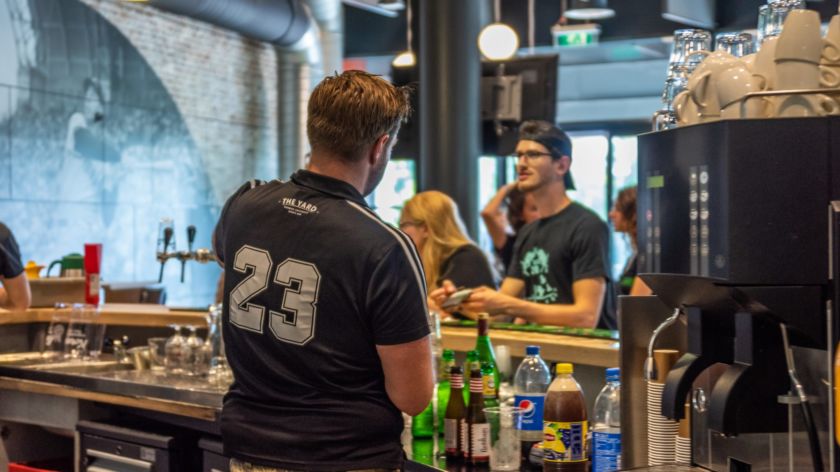Finding a job as an international student: ‘I almost couldn’t pay my rent’
-
 Photo: Juliette Breuseker
Photo: Juliette Breuseker
After taking the leap of moving to the Netherlands, many international students want to work a part-time job to support themselves and become independent. But finding a job and adjusting to Dutch workplace culture isn’t always easy for internationals. ‘International students are an asset to Dutch companies.’
‘I spent four months checking Campus Detachering for English vacancies,’ says Lia Millar, a master’s student of environmental studies from the United States. ‘Most vacancies were in Dutch or a combination of Dutch and English. The few English-only vacancies are very popular among international students – all my international friends applied to those.’ In March of 2021, Millar got a job as a member of a social media team at Radboud University. ‘My boss found my TikTok videos and really liked them, so I was offered a job. I definitely got very lucky.’
Work permit regulations for international students
The Dutch Immigration and Naturalisation Service (IND) makes a distinction between students with an EEA or Swiss passport and those without a non-EEA or Swiss passport. Students with an EEA or Swiss passport don’t need any additional work permits and have no limit on the number of hours they can work. Students from non-EU countries, however, need a work permit from the Dutch government which has to be applied for by their new employer. The work permit states that they can either work a maximum of 16 hours per week for the entire year or full time during the 3 summer months (June, July and August).
Ali Saad, a spatial planning student from Lebanon, went to employment agencies to find a job, but, he says, they turned him down because of his residence permit: employers need to apply for a work permit (see box) to hire a non-EU international student. A procedure that is often too complicated for employers and they end up hiring someone else. Saad’s mental health suffered because he wasn’t able to find a job. ‘I almost couldn’t pay my rent. It stressed me out so much that it caused my grades to plummet, and I considered going back to Lebanon.’
‘We frequently hear about this problem,’ says Karel Leusink, a Radboud alumnus and one of the co-founders of International Students Work (ISW), an organisation that helps international students from Arnhem and Nijmegen to find part-time employment. ‘Applying for a work permit costs time and therefore money and most employers have never done it before.’
ISW functions as an intermediary between international students and their employers, by, for example, helping them to sort out issues like getting a work permit. Danna Tania, an international student from Indonesia who recently joined the ISW team, has some personal experience with the difficulties of getting a job in the Netherlands: ‘I didn’t know how to get basic health insurance, which is something you need for employment. It made me realise how necessary something like ISW is to help international students.’
Work culture
Once they have found a job, international students also need to get used to the Dutch workplace culture. ‘At my job in the US, there was this sentiment that your job is your whole life,’ says Millar. ‘That’s not really the case here. My boss never expects me to work overtime.’ But there are still some things she wishes would change.
Millar says that a lot of those changes are related to language: ‘Even though my work experience here has been amazing so far, I don’t feel like I can grow as much professionally, because I don’t speak Dutch fluently,’ she explains. ‘I still get lots of work emails in Dutch which have to be translated for me. Radboud is on the right track, but I think they could make more progress with regard to internationalisation.’
Saad eventually found a job through ISW: ‘My boss is very kind, and I can call him by his first name, which is quite unlike the hierarchical workplace culture in Lebanon.’ But for him, the issue with employment rules for international students remains: ‘I come from a very hardworking culture. I’m sure I can keep up with my studies while working more than 16 hours.’ And while surviving on his current income is possible, according to Saad, he hopes that Dutch politicians will change employment rules, making it easier for non-EU international students to make a living.
While Leusink and Tania are aware of the challenges that come with employment rules for non-EU internationals, they also want to emphasize the benefits of hiring international students. ‘Internationals are an asset to companies,’ Leusink explains. ‘Because of their different cultural backgrounds, they often have different approaches to solving problems. This is great for companies that value thinking outside of the box.’ Tania: ‘We get a lot of positive feedback from the companies that we work with. We hope to help many more international students to find their place in the Dutch job market.’
International students at the Radboud University
About 10 percent of students (excluding exchange students) at Radboud University are international students. Additionally, the university welcomed around 160 exchange students for the study year 2021/22.



